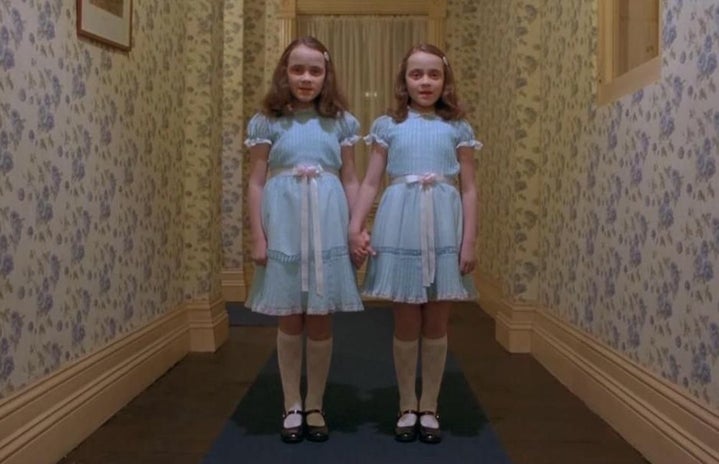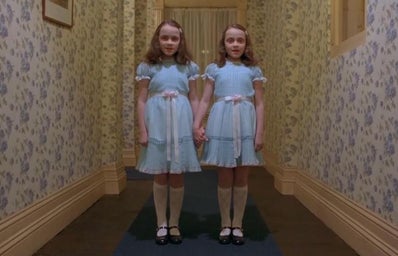Every year during Halloween season, millions of college students nationwide line up outside of their favorite scary attractions. But what is it in our brain that makes us love fear? More specifically, what is the psychology behind haunted houses and why do we like them?
From smaller, community-organized scare nights to highly produced spectacles like Knott’s Scary Farm and Universal’s Halloween Horror Nights, visiting one of these fear factories is a spooky season tradition for so many of us. And even if we’re not entering them ourselves, we’re watching content about them online (#hauntedhouse has 2 billion views on TikTok) or indulging in horror movies that feature them. Gen Z makes up the bulk of haunted house fans, too: in fact, the most common demographic for haunted house attractions is teens and young adults between the ages of 18–34, according to America Haunts. Is being terrified… fun?
Well, for a lot of us, it is.
It’s no secret that Gen Z seems to have some sort of fascination with morbidity.
It’s no secret that Gen Z seems to have some sort of fascination with morbidity. Whether it’s diving headfirst into the skulls and crossbones of the pop punk revival or obsessing over serial killers and true crime podcasts, Gen Z has an attraction to the darker things in life.
“Haunted attractions trigger a fight or flight instinct for me, and these experiences let me indulge in the adrenaline rush without the fear of actually being harmed.” says Van, 21, a senior at Chapman University. “I think many people in my generation really like these things because it lets you overcome fears and feel intense emotions while still having that safety net.”
Kayleigh, 21, a senior at The University of Pittsburgh, has also always been drawn to the more macabre things in life.
“I think our generation as a whole really likes things that thrill them,” Kayleigh tells Her Campus. “When I was little, I always wanted to be something scary for Halloween instead of something cute, so I feel like it’s been ingrained in me for a while.”
Just like fear is a part of human nature, so is having some sort of attraction or fascination with being afraid.
It isn’t just Van, Kayleigh, and other members of Gen Z that have a particular attraction to the spookier things in life. Just like fear is a part of human nature, so is having some sort of attraction or fascination with being afraid.
According to Shagoon Maurya, a psychologist specializing in emotional distress, the way the human brain is wired may have something to do with why we’re drawn to the things we fear.
“We enjoy scary experiences and putting ourselves in scary situations because of the feelings it gives us,” Maurya says. “Our heart rate goes up and our muscles feel tense. There’s a lot of physiological reactions that make us feel good.”
According to a 2019 study published in Emotion, people may actually find themselves in a better mood after experiencing a haunted house. In this study, 262 people filled out a survey about their moods before and after experiencing Scare House, one of Pittsburgh, Pennsylvania’s most popular haunted attractions.
“Once you’re out of the scary situation, one where there was never any real threat to begin with, feel-good endorphins course through the body.”
While 33% of participants felt no noticeable mood change, and 17% reported being in a worse mood, 50% of participants concluded an increase in their mood after completing the haunted house. Among these fear junkies, many cited a championing feeling of “challenging their fears” along with describing the experience as “thrilling.”
“Once you’re out of the scary situation, one where there was never any real threat to begin with, feel-good endorphins course through the body,” Maurya says. “We like the thrill in it, and enjoy being scared and feeling challenged by the fear. It gives us a feeling of euphoria.”
While the reactions to haunted houses can change from person to person and brain to brain, the way some of us crave fear comes down to brain chemistry.
A 2008 study led by David H. Zald, an adjunct professor at Vanderbilt University, found that dopamine is one of the main hormones released during scary and thrilling activities. And some people can experience an extra kick of this dopamine while they’re afraid. In essence, their brains lack what Zald describes as “brakes” when it comes to dopamine. So, this means some people are going to really enjoy thrilling, scary, and risky situations while others will avoid them at all costs.
As a generation raised through turmoil, Gen Z may see haunted attractions as a means of controlling their fears, as well as the unexpected.
Beyond psychology, as a generation raised through turmoil, Gen Z may see haunted attractions as a means of controlling their fears, as well as the unexpected. After all, between the looming threat of global warming, political chaos, and other factors out of our control, a couple of actors in spooky costumes don’t seem all that bad, right?
Not only do haunted houses provide a feeling of control, but they also instil a certain confidence into many people. Think about it: you just ran through a haunted house full of clowns and demonic wax figurines scot-free. Who cares if they’re literally just normal people getting paid to freak you out? You made it through without collapsing, getting escorted out, or peeing yourself. And that’s a cause for celebration (and a good old-fashioned confidence boost).
But just remember: haunted houses aren’t everyone’s cup of cider. If you’re feeling scared, just know there’s no shame in waiting outside with a hot apple cider. After all, who needs a haunted house to get a rush of dopamine when cider exists?
Expert:
Shagoon Maurya, Psychologist
Studies Referenced:
Kerr, M., et. al. (2019). Voluntary arousing negative experiences (VANE): Why we like to be scared. Emotion.
Zald, D.H., et. al. (2008). Midbrain Dopamine Receptor Availability Is Inversely Associated with Novelty-Seeking Traits in Humans. The Journal of Neuroscience.


